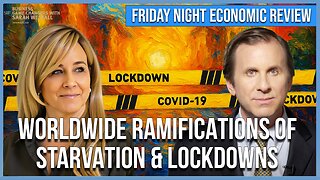Premium Only Content

Covered By Grace: Discovering True Righteousness
Have you ever wondered what it truly takes to be right with God? It’s a question that has echoed through the ages, and the answer might be simpler, yet more profound, than you think. The core of the matter lies not in what we do, but in what has already been done for us.
The truth is, as the scriptures declare, “There is none righteous, not even one“. This powerful statement from Romans 3:10 reveals a fundamental reality about humanity – we all fall short. No matter how good we try to be, our own efforts are insufficient to bridge the gap between us and a Holy God.
So, how then can anyone be made right? The answer lies in a revolutionary concept: justification by faith apart from works of the law. This isn’t a new idea; it’s a principle beautifully illustrated in the life of Abraham, a figure revered across generations.
Consider Abraham. Was he declared righteous because of his exemplary behavior? The scripture says, “Abraham believed God, and it was credited to him as righteousness”, as found in Genesis 15:6. The book of Romans elaborates on this, asking, “What then shall we say that Abraham, our forefather according to the flesh, has found? For if Abraham was justified by works, he has something to boast about, but not before God. For what does the scripture say? ‘Abraham believed God, and it was credited to him as righteousness'” (Romans 4:1-3).
Notice the recurring word: credited. This is a key theological term, akin to a banking transaction. It signifies that God, through grace, places His righteousness into our account, not because of anything we have earned, but simply because we believe.
Think about it this way: “Now to the one who works, his wage is not credited as a favor, but as what is due. But to the one who does not work, but believes in him who justifies the ungodly, his faith is credited as righteousness” (Romans 4:4-5). This highlights a crucial distinction. If righteousness were earned through works, it would be an obligation, something God owed us. But instead, it is a gift freely given to those who place their trust in Him.
This concept isn’t limited to Abraham. King David, despite his significant failings, also understood this profound truth. “David also speaks of the blessing on the man to whom God credits righteousness apart from works: ‘Blessed are those whose lawless deeds have been forgiven, and whose sins are covered; blessed is the man whose sin the Lord will not take into account'” (Romans 4:6-8), quoting Psalm 32:1-2. David’s experience shows that blessing and being made right with God come through forgiveness, a covering of our sins that is not based on our own merit.
This realization often comes as a “Eureka” moment – a sudden understanding of our own inability to cleanse ourselves and the acceptance of God’s provision. It’s discovering that like Abraham, we have something about our flesh – a stain of sin – that no amount of religious activity can wash away. But then, we discover that God has already provided a substitute.
While salvation is received through faith alone and by grace alone, this faith is not meant to be stagnant. Just as a prisoner who has been acquitted shouldn’t remain in their cell, we are called to live out the reality of our forgiveness.
The beautiful truth is captured in Micah 7:19: “He will turn again; he will have compassion on us. He will tread our iniquities underfoot. You will cast all our sins into the depths of the sea.” This is the foundation of our hope and the reason for our joy. We are declared righteous, our sins are forgiven and forgotten, not because of what we’ve done, but because of God’s incredible grace.
Have you experienced this “Eureka” moment? Perhaps today is the day to embrace this truth and be covered by grace.
-
 LIVE
LIVE
Flyover Conservatives
21 hours agoURGENT FINANCIAL UPDATE! October 14–31: The Great and Terrible Day Has Arrived - Bo Polny; 5 Mindsets You Must Master - Clay Clark | FOC Show
735 watching -
 LIVE
LIVE
I_Came_With_Fire_Podcast
10 hours agoChina Owning the Mississippi? | Letitia James Indicted, But Don't Get Excited | Insurrection Inbound
116 watching -
 58:29
58:29
NAG Podcast
3 hours agoChrissie Mayr: BOLDTALK W/Angela Belcamino
582 -

Dr Disrespect
13 hours ago🔴LIVE - DR DISRESPECT - BATTLEFIELD 6 - THE WAR BEGINS | BF6 LAUNCH DAY
164K15 -
 LIVE
LIVE
SpartakusLIVE
3 hours agoBF6 LAUNCH DAY || WZ and BF6 followed by PUBG - The PERFECT Combo?
259 watching -
 2:35:29
2:35:29
Bare Knuckle Fighting Championship
4 days agoBKFC ICE WARS 3: Laporte vs Lafferière
22.1K -
 55:11
55:11
Sarah Westall
2 hours agoHidden Forces: Global Pushback from Lockdowns, Starvation and Death is Real w/ John Tamny
3.64K -
 LIVE
LIVE
SynthTrax & DJ Cheezus Livestreams
1 day agoFriday Night Synthwave 80s 90s Electronica and more DJ MIX Livestream FUTUREPROOF / VARIETY Edition
118 watching -
 8:59
8:59
China Uncensored
8 hours agoChina Just Declared Economic WAR On The US
3.35K11 -

LFA TV
23 hours agoLIVE & BREAKING NEWS! | FRIDAY 10/10/25
162K42